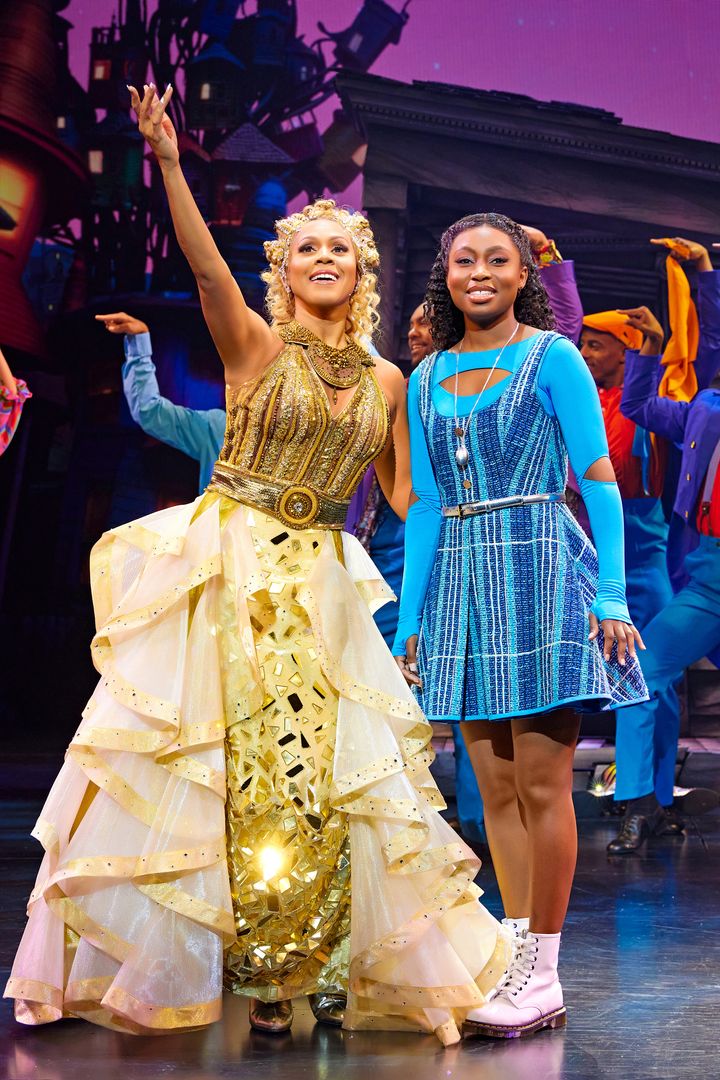
Schele Williams is making her Broadway directorial debut this spring with both “The Notebook” and the revival of “The Wiz” ― an artistic achievement she describes as “a milestone that I wish never happened.”
As numerous outlets have pointed out, Williams, who directed Elton John and Time Rice’s musical “Aida,” which Williams also starred in for its lead role, is the first Black woman to direct a full-fledged musical on Broadway since Vinnette Carroll, who in 1972 staged “Don’t Bother Me, I Can’t Cope” at the now-defunct Playhouse and Edison theaters.
There have been other trailblazers, of course, including Camille A. Brown, who directed and choreographed “For Colored Girls Who Have Considered Suicide/When the Rainbow Is Enuf,” Broadway’s experimental “choreopoem” billed as a “play with music,” in 2022.
But given the scope and popularity of musicals like “Dreamgirls” and “The Color Purple” that highlight Black women’s experiences, Williams’ achievement is noteworthy.

“There have been so many huge, epic musicals about Black women, and the fact that none of them ― none of those teams, none of those producers ― ever went, ‘Oh, you know it would be great to have a Black woman’s voice behind the table guiding this,’ blew me away,” Williams told HuffPost. “It’s been a real reckoning for me as a director and an artist on Broadway to say, ‘You know what? No longer am I going to walk into a room and reduce myself to what I believe the room can accept of me.’”
“The Notebook” and “The Wiz” “represent two very different sides of my life,” Williams said, noting that both musicals feature Black women in principal roles. Co-directed by Michael Grief, “The Notebook” is based on Nicholas Sparks’ tearjerker romance novel that was adapted for the big screen in 2004. The musical features three sets of mixed-race actors as Noah and Allie, the characters played by Ryan Gosling and Rachel McAdams, respectively, in the film, at varying ages.

“The Wiz,” a reimagined take on “The Wizard of Oz” featuring an all-Black cast, has been a cultural touchstone for Black audiences since it premiered on Broadway in 1975. Actor Nichelle Lewis stars in the revival as Dorothy, a role that catapulted Stephanie Mills to fame 49 years ago.
The decision to reimagine “The Notebook” with a mixed-race couple at its center was made by composer-lyricist Ingrid Michaelson and writer Bekah Brunsetter. With Grief and Williams on board as co-directors, the team shifted the musical’s setting from the Deep South to the mid-Atlantic and changed the time period from the 1940s to the 1960s.
As in the book and the film, much of the stage play takes place in a nursing home, where the older Allie resides after being diagnosed with Alzheimer’s disease. That aspect of the story, Williams said, “hit me square in the chest,” given her own mother’s experience with Alzheimer’s.

John Nacion via Getty Images
“To be included in a story that I knew so well and that so many of us from so many races know so well meant a lot,” Williams said. “There’s a beautiful lyric that Ingrid has: ‘I am still in here.’ And no matter what the reality for a person with Alzheimer’s might be at a given moment, the person that you love is in there. So I knew it was going to be a beautiful healing and learning process for me.”
“The Wiz,” of which Williams is the sole director, presented a unique set of challenges. Last revived on Broadway in 1984, the musical was “a real time piece from the ’70s, a great time for Black culture,” she said. And despite its beloved score, a fusion of R&B, gospel and jazz, many of its references seemed dated by modern standards.
“I thought of my daughters, who are 12 and 13, and how they’d find ownership inside this story,” Williams said. Together with writer Amber Ruffin, she worked to update the show in ways that would “acknowledge the cultural impact that Blackness has had on fashion, music and dance,” but “didn’t feel like we’re trying too hard to make it hip.”

As a result, choreographer JaQuel Knight has reimagined “He’s the Wiz” ― a song performed after Dorothy is transported to Oz by a tornado that unexpectedly kills the Wicked Witch of the East ― as a New Orleans second-line parade. “Slide Some Oil to Me,” sung by the Tin Man (Phillip Johnson Richardson), now embraces a hip-hop vibe, while audiences might detect a hint of Mariah Carey’s signature riffs in Lewis’ chilling rendition of “Home,” the second-act showstopper.
The one-two punch of her Broadway directorial debut now behind her, Williams plans to “dive in and see every show” that’s opened on the Great White Way this season (there’s been a lot) before beginning work on a number of new, female-centric projects that are in early development.
Her advice to aspiring theater directors, she said, is simply to master the art of patience.
“I’ve got a good hustle. I’ve always had great faith and I’ve never been shy to work,” she said. “I never believed that it wouldn’t happen.”
